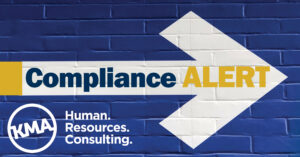 Remember a few years ago when we had a new overtime rule that was halted at the 11th hour? Get ready for round two, only this time at a lower salary rate.
Remember a few years ago when we had a new overtime rule that was halted at the 11th hour? Get ready for round two, only this time at a lower salary rate.
The U.S. Department of Labor (DOL) has announced a Notice of Proposed Rulemaking (NPRM) and this new proposal would update the salary threshold for employees exempt from overtime using current wage data, projected to January 1, 2020.
- The result would boost the standard salary level for employees exempt from overtime from $455 to $679 per week (equivalent to $35,308 per year).
- The proposal does not call for automatic adjustments to the salary threshold.
Under currently enforced federal law, employees with a salary below $455 per week ($23,660 annually) must be paid overtime if they work more than 40 hours per week. Workers making at least this salary level must also meet duties test to be exempt from overtime.
The U.S. DOL is also asking for public comment on the NPRM’s language for periodic review to update the salary threshold. An update would continue to require notice-and-comment rulemaking.
In developing the proposal, the U.S. DOL received extensive public input from six in-person listening sessions held around the nation and more than 200,000 comments as part of a 2017 Request for Information (RFI).
This is a federal change and states may have different requirements. In Maine, the minimum salary requirement is currently $634.62 per week or $33,000 annually and it changes with minimum hourly pay rate adjustments.
For More Information
More information about the proposed federal rule is available at www.dol.gov/whd/overtime2019.
The public may submit comments about the proposed rule electronically at www.regulations.gov, in the rulemaking docket RIN 1235-AA20. Once the rule is published in the Federal Register, the public will be able to submit comments for 60 days in order for those comments to be considered.
Employers should review employee compensation in preparation for the proposed change including whether employees meet both the salary and duties tests to be exempt with this new rule.
For Help
If you need help with employee compensation or other issues, contact KMA today.
